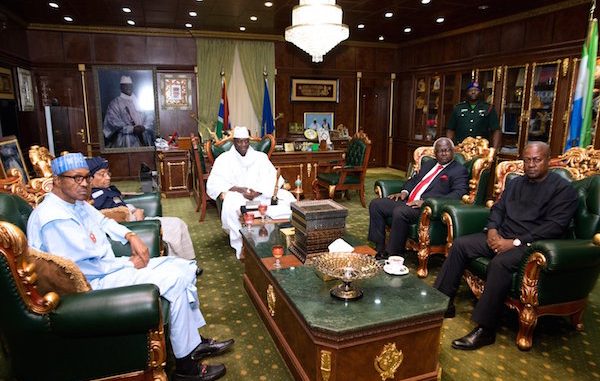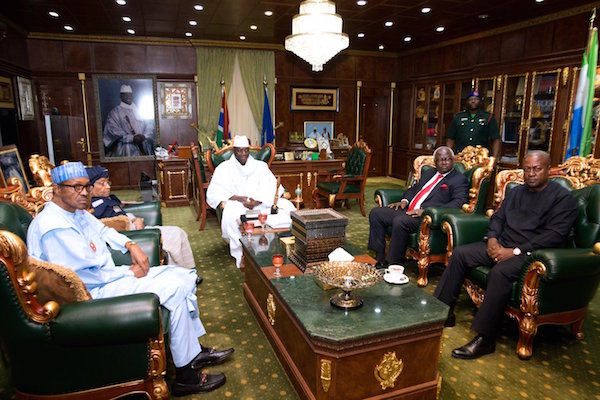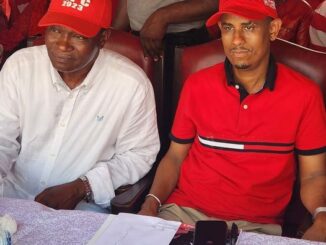
Wednesday, December 14, 2016
The transition from the outgoing to the incoming president-elect continues as a high-powered delegation of four heads of state and a UN representative met with the incumbent president to discuss the impasse that stalled the initial process.
The fact-finding delegation comprised Ecowas chairperson President Ellen Johnson Sirleaf of Liberia, President Ernest Bai Koroma of Sierra Leone, President Muhammadu Buhari of Nigeria, President John Dramani Mahama of Ghana and the special representative of the United Nations Secretary General for West Africa and Sahel, Dr Mohamed Ibn Chambas.
The delegation met with outgoing president Yahya Jammeh at State House in Banjul before meeting president-elect Adama Barrow and his coalition team at the Coco Ocean Hotel in Bijilo.
They also met with the chairman and other commissioners of the Independent Electoral Commission, and security chiefs.
The leader of the delegation, President Johnson Sirleaf, briefly told journalists that both the outgoing and incoming presidents and their teams promised to maintain the peace and stability in the country as the transition process continues.
She said one of the key concerns of the delegation and Ecowas as a whole is to make sure that peace continues to reign in The Gambia.
As a fact-finding mission, she said they will submit their report to the Ecowas Commission to be discussed at the forthcoming Summit of Ecowas Heads of State on Saturday in Abuja, Nigeria.
The coming of the delegation was prompted by outgoing president Jammeh’s rejection of the result of the 1st December 2016 presidential election, which he initially described as “most transparent and rig-proof”. He also called for a fresh election.
This has raised some fears in the country and stalled the transition process.
In view of the heightened tension in the country, regional leaders are calling on Jammeh to step down in the interest of peace.
In her statement, the Ecowas chairperson inferred that they are yet to convince Jammeh to step down when the transition period ends in January.
“It is not something that can happen in one day. It is something that we have to work on,” she said.
Earlier on Halifa Sallah, spokesperson of the coalition, said they had told the delegation that when the transition ends and Jammeh said he would not go, there “will be a constitutional crisis and a likely conflict in the country”.
“We had indicated to them that there is relative peace in The Gambia today, because of our adherence to the constitutional provision that even though president-elect Barrow is the elected incoming president, there is a transition period in our constitution that makes President Jammeh to stay in office until the expiration of his term,” he said.
Mr Sallah said they told the visiting heads of state to talk to Jammeh to open the line of communication so that the transition can progress, and also to revoke the declaration he made to annul the result.
“They [the heads of state] agreed with us that this is the way forward,” he said.
“They told us incoming president Barrow should counsel our supporters to prepare for the transition phase, and to prepare to assume office after the expiration of the term of office of the outgoing president.”
He further stated that the issue of military intervention does not arise for now.
“But if the transition phase is completed and Jammeh says he would not leave office, then there would be a constitutional crisis where his [Jammeh’s] own government will be an outlawed government, and that may provoke military crisis and other crises.”
Author: Lamin Jahateh and Kaddijatou Jawo



